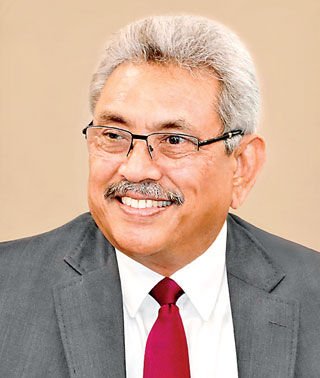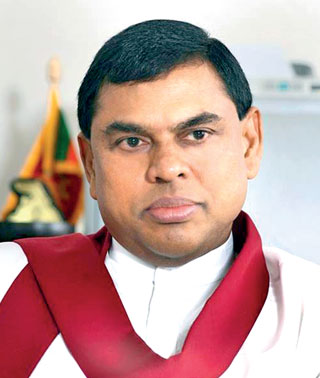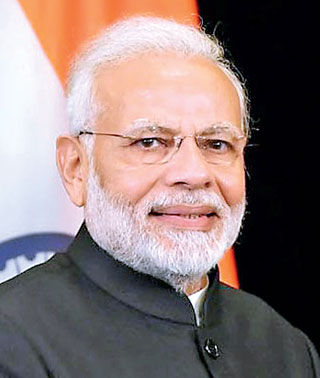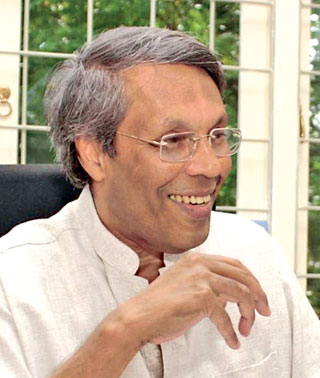Thursday Feb 26, 2026
Thursday Feb 26, 2026
Thursday, 24 February 2022 00:20 - - {{hitsCtrl.values.hits}}

President Gotabaya Rajapaksa

Finance Minister Basil Rajapaksa

Indian Prime Minister Narendra Modi

Dr. Kumar Rupesinghe
|
Across a dining table in Moscow, I asked US Ambassador to Russia, Jon Huntsman, epitome of civility and discernment, former ambassador to China, personal friend of Lee Kuan Yew, and someone who had discussions with Xi and Putin (and Trump, of course), why Washington had upended Kissinger’s grand-strategic logic of playing off Russia and China against each other while drawing them both in as US partners and stakeholders in stabilising an unstable world order, and opted instead to do the opposite—act in a manner that drove Russia and China into each other’s arms.
and discernment, former ambassador to China, personal friend of Lee Kuan Yew, and someone who had discussions with Xi and Putin (and Trump, of course), why Washington had upended Kissinger’s grand-strategic logic of playing off Russia and China against each other while drawing them both in as US partners and stakeholders in stabilising an unstable world order, and opted instead to do the opposite—act in a manner that drove Russia and China into each other’s arms.
Ambassador Huntsman answered my question with a counter-question: “I’ve sat down with both, and Xi is mainly about economics, Putin is mainly about hard-power, so what is it that Russia and China can offer each other over the long-term that the USA cannot?”
My answer, in the presence of India’s Ambassador to Russia, Venkatesh Varma, was “They offer each other a safe rear-area in the face of a perceived US buildup against both.”
GR: Getting to ground-zero
If Basil Rajapaksa wanted a snap local authorities election but was blocked by his Cabinet colleagues, as reported the media, then BR was right and his seniors and peers dangerously wrong.
It is far wiser to hold an election that can open the safety valves and achieve some decompression before or even during a massive social eruption (as JRJ did with the PCs in 1988) than to keep the boiler tightly shut-off.
Going by the statistical survey September-October 2021 conducted by the Center for Policy Alternatives (CPA), President Gotabaya Rajapaksa seems to have done a Ranil.
GR seems to have reduced the hardcore vote-base of the phenomenally successful Pohottuwa to the same percentage that Ranil Wickremesinghe reduced the UNP. The country’s largest single party when he took over, so sizeable and solid that a two-thirds majority in Parliament under proportional representation was thought impossible by President J.R. Jayewardene, Ranil reduced the UNP to 23% by February 2018, before it disappeared off the electoral map in 2020.
Today, 23% looks like the (reducible) hardcore SLPP vote on President GR’s watch. It took him two years, while it took Ranil over 20. GR may have “done it best”, yet again. At this accelerated rate of shrinkage, what will be left of the SLPP’s vote base in three years?
There are four key takeaways in the CPA survey. Here are the first three as summarised on an Asian media platform:
“A majority of respondents (64.1%) said that it is unlikely that during its term in office, the Gotabaya Rajapaksa Government would lift the country from the economic crisis it has been in.”
“A majority of respondents (72.1%) were of the opinion that even though chemical fertilisers are not good for one’s health, until a viable solution is found, chemical fertilisers should continue to be used to some extent.”
“Only 23% of the respondents were of the view that chemical fertilisers must be completely stopped, immediately.”
Given that the 20th amendment centralises power in the President, the buck stops with him; the overnight shift from chemical fertiliser is the President’s signature policy; it negatively impacts millions directly and millions more indirectly; the percentage that supports him on this issue can be taken as the bedrock vote-base of the regime—and that’s just 23%. However, when the harvest collapses and sets off a chain reaction, even that meagre 23% is going to drop.
|
SLFP surfacing
What will the Sri Lanka Freedom Party (SLFP) led by former President Maithripala Sirisena do, when, and with whom?
Maithripala Sirisena is a rare political animal belonging to a species that was numerous but almost went extinct, yet may re-emerge strongly to reclaim its space. That is the old centre-left SLFP: Nonaligned, democratic, moderate, reformist, peasant-based, populist-nationalist.
Election results prove that insofar as the Yahapalanaya experiment in bipartisanship had an upside, the voter tends to identify it with President Sirisena, just as it identifies him as the counterweight to the downside of Yahapalanaya—a downside it identifies with the UNP.
If the SLFP does not leave the Government as the harvest collapses, then its residual vote-base will accrue to the SJB or JVP-NPP. If it does leave the Government, how much of the SLPP’s remaining 25%-30% vote will stay?
Military measures
There is a fourth key takeaway from the CPA Sept-Oct 2021 survey which should be meditated upon by those on the ultranationalist Far Right who wish the President to rule together with the Army, or for the Army to take over the country’s governance:
“There appeared to be overwhelming support for the military as a result of its efforts to mitigate the COVID-19 crisis in the country. However, when asked as to whether the country should be governed by the military, a substantial majority (70.8%) said ‘No’.”
The pie-charts reveal that 61.7% of the Sinhala people disagree that the military should rule the country. The figures for the other communities are much higher.
If one wants to calculate the support for the Far Right on this island, there you have it: the 30% that does not disagree that the military should govern the country.
What a post-SLPP/post-Rajapaksa/UNP-derived Government should be aware of is that if it tries the Ranil Wickremesinghe policy route again, the third time won’t be the charm in a society in which 30% – and 35% among Sinhalese—don’t mind military rule. That can grow, given the right kind of enemy in Government.
Discussions on Sri Lanka’s Defence apparatus tend to ignore the role of private security entities, but Secretary/MoD, General Kamal Gunaratne made a definitive doctrinal declaration two months back, while addressing Sri Lanka Security Service Providers Association’s Annual General Meeting 2021 as the Chief Guest:
“…the private security companies are contributing a greater share in ensuring the national security of the country which has evolved into a wider spectrum of security needs in the recent past…holding the responsibility of ensuring the national security as the Secretary Defence, it is my strong belief that the members of the private security entities of almost 150,000 have become an integral part of it, as stakeholders in the national security apparatus in Sri Lanka”.
Ironically, the Gotabaya administration has by its own actions and inactions severely jeopardised the strategic situation of the Sri Lankan military. By giving the military and especially the wartime ex-military brass a high profile in the state and para-state (‘task forces’) apparatuses, GR and his co-thinkers have enhanced the target profile of the SL military in the global arena.
By refusing to proceed with internationally credible national accountability processes as recommended by the three Presidential Commissions appointed by President Mahinda Rajapaksa, and actually practicing reverse accountability (the Sgt. Sunil Ratnayake case), President Gotabaya has strengthened the argument for international accountability, which may be triggered under the rubric of universal jurisdiction in several countries in the wake of Human Rights High Commissioner Michelle Bachelet’s written report on 3 March.
By action and inaction in this regard, by his failure to weed out the rotten apples and restore credibility the President has permitted the legitimacy of our entire war to be called into question.
By his fertiliser policy and its impact on farms and peasant families the President has opened the possibility of dissension between the rank-and-file military from rural areas and the officer corps, or perhaps even within the officer corps itself.
A military crackdown on protestors will isolate Sri Lanka still further, totally de-stabilising the economy, and escalating protest, resistance and rebellion on multiple fronts in an uncontrollable upward spiral of social bitterness and outrage. The military will lose its popularity and safe, solidly supportive social rear-base while it also faces international prosecution, sanctions and encirclement.
|
China’s cards
Parliament should urgently impose a moratorium on massive infrastructure projects costing billions of dollars until the crisis is resolved. It is an economic and social crime that such costs are incurred at this time. That crime is compounded when the cost criterion is ignored and preference shown to a vastly costlier option.
When a Chinese corporate listed in the Fortune 500 writes to President GR complaining that a local company tendering for a contract to build an expressway has been preferentially opened despite the fact that the local tender at $ 374.4 billion is a colossal $ 160 billion higher than the only other bid by the Chinese giant, then things become mighty clear.
Firstly, the fear of a non-transparent, non-level playing field, first articulated by the Americans in relation to Chinese businesses in Sri Lanka, is now being articulated by Chinese businesses themselves.
Secondly, if this is the signal picked up locally by Chinese corporates and shared with their peers back home, who is going to invest in the expensive Port City? El Chapo’s successor?
Ranging from irrational preferences in the award of contracts to the disastrous penalising the peasantry through a subjective, unscientific fertiliser policy, there is every sign that Sri Lanka under its present dispensation could become a quagmire for China. The GR regime could become more of a liability than an asset to a strategic partner who is a rational actor playing the long game.
The public event celebrating the 65th anniversary of the establishment of Ceylon’s diplomatic relations with China and the 70th anniversary of the Rubber-Rice Pact confirmed that warm appreciation of China is shared across the island’s political spectrum from Government to Opposition.
The only real problem any rational, realist Sri Lankan political leader or party could have with China is not existential but tactical and ‘conjunctural’ i.e., situational: its patronage of an increasingly dysfunctional, unpopular and unviable Gotabaya regime.
As South Asia proves, China’s interests are far better served by an Imran Khan, a poster-personality for China’s patronage, than by President GR’s volatile subjectivism. Imran Khan’s glowing praise for China’s economic success especially in poverty alleviation did not prevent him from being invited to and participating in President Biden’s Democracy Summit, unlike President GR who just couldn’t make the cut.
|
Confronting the Church
When regimes find themselves on the ropes or on the way out, hardcore elements (Deep State, militia or contractors) resort to outrageous methods to polarise things in their favour; methods which almost always fail and make things worse, including for themselves.
Who had the bright idea, and who signed off on that bright idea, of officers in plain clothes, grabbing courageous young Catholic activist Shehan Malaka Gamage and doing so on the eve of the United Nations Human Rights Council session? The Minister under whom the relevant institution is vested is the one who is accountable in Parliament.
Shehan Malaka is not the sort who would cave in. He has already set an example. If anything were to happen to him, he would attain the status of martyr, inspiring many others of his generation in the local Catholic community and way beyond our shores.
Didn’t the authorities know that the Church would stand behind him? Was the arbitrary arrest meant to intimidate the Church or only young Catholic social activists?
It is impossible to prevail over the legitimate campaign for justice by a religious minority that has a global rear-base as large as the population of China.
The Catholic Church is the oldest international organisation on the planet and is also the transnational organisation capable of wielding the greatest “soft power”.
Is there a desperate bid by the hawks to polarise things along religious majority/minority lines, so that the Sinhala majority forgets its economic anguish and rallies around the “Sinhala Buddhist” militaristic regime?
In the second term of Mahinda Rajapaksa who had excellent relations with the Catholic church, the rising power backstage of the Hard Right was such that an Indian nun belonging to the Catholic order founded by Mother Theresa was incarcerated, while a significant percentage of those who died of shooting and rifle-butt bludgeoning in Katunayaka, Chilaw, Rathupaswela were Catholics.
By whose order were armed STF troopers deployed in the first two cases and the military in helmets, body armour, armoured personnel carriers and with automatic weapons deployed in the third?
Will 13A survive?
Are these the last days of the 13th amendment? The statement of the Ministry of External Affairs of India issued after the discussion of the Foreign Ministers of India and Sri Lanka, mentioned Tamil rights but for the first time, desisted from mentioning the 13th amendment. Could this be interpreted as meaning that India is open to going beyond the 13th amendment?
The trend in Sri Lankan politics doesn’t indicate that. The interview given by Foreign Minister G.L. Peiris to the Indian Express accurately points out that the de facto allies in the Yahapalanaya administration, including the TNA and the JVP introduced amendments to the election law which threw a spoke in the wheel of holding the Provincial Council elections, thereby putting 13A in a coma. He goes on to say that the matter will be resolved in the draft of the new Constitution, but does not indicate whether that draft will carry over the content of the 13th amendment without shrinking it, and certainly gives no sign that it will go beyond it.
When the visiting Foreign Minister of Sri Lanka does not give any such assurance while hoping for a bailout from India, referring fulsomely to India’s supportive role and using the term ‘integrate’ (in the economic sense), he obviously does not sense any conditionality or feel any compulsion to keep the promises on devolution he made in Delhi in 2011.
There is a last chance, framed by three events: the Tamil Nadu state assembly elections, Minister Basil Rajapaksa’s visit to India to sign on the dotted line; and Prime Minister Modi’s visit to Colombo for BIMSTEC.
The grave strategic error of post-war Tamil politics was not evolving a division of labour in which the diaspora lobbied on accountability and the Tamil parliamentary parties worked strictly on consolidating devolution with India’s help and within India’s parameters. Instead, pushing for a hybrid accountability mechanism it divided the hybrid Yahapalanaya administration; pushing for a non-unitary constitution, it delegitimised the UNP.
The Tamil parties got their arithmetic and geopolitics wrong. While the diaspora and the West have more importance in the matter of wartime accountability, India, with 80 million Tamils in Tamil Nadu remains by far the most important geopolitical factor in obtaining and retaining any measure of autonomy on the island.
The GTF’s recognition of the role and importance of Tamil Nadu Chief Minister Stalin is a belated dawning of reality, but Stalin’s closest contact on the island is the impressively articulate young Jeevan Thondaman, a cabinet minister who regards Prime Minister Mahinda Rajapaksa almost as an uncle.
In a burst of characteristic unrealism, TNA remarks on Prime Minister Modi’s impending visit mention “going beyond the 13th amendment”, when in the real-world danger is that the 13th amendment could be
“going, going, gone”.